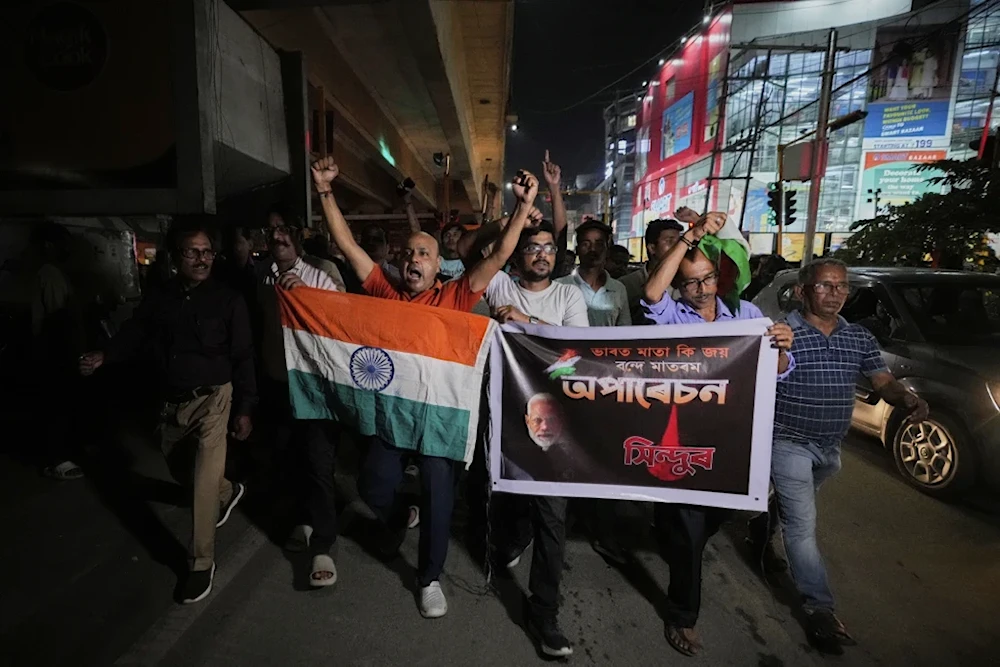Pakistan launched multiple attacks along India's western border
India accuses Pakistan of launching multiple drone and artillery attacks across its western border, intensifying a deadly escalation over Kashmir that has left nearly four dozen dead, as both sides trade fire and global powers urge immediate de-escalation.
-

People holding Indian national flags rally's in support of the Indian Army as they celebrate the success of 'Operation Sindoor'; in Guwahati, India, on May 8, 2025 (AP/Anupam Nath)
The Indian Army reported on Friday that Pakistan launched "multiple attacks" using drones and other munitions across India’s entire western border, intensifying the India-Pakistan conflict following recent airstrikes by India on alleged terrorist camps in Pakistan.
Multiple attacks were launched by Pakistan's armed forces using drones and other munitions along India's entire western border, the Indian Army said.
This marks a dangerous escalation between the nuclear-armed neighbors, who have been locked in conflict since India’s airstrikes against Pakistan on Wednesday.
Those strikes, according to New Delhi, targeted "terrorist camps" in Pakistan in response to the deadly Pahalgam attack in Kashmir last month. India has blamed Islamabad for its role in that attack, an allegation Pakistan denies.
Since then, both nations have exchanged cross-border firing and shelling, with drones and missiles entering each other’s airspace, and nearly four dozen people reported dead as violence has intensified across the de facto border in Kashmir and beyond.
India says drone strikes repelled, Pakistan denies cross-border attacks
The Indian Army accused Pakistani troops of committing “numerous ceasefire violations” (CFVs) along the Line of Control (LoC), the informal frontier in Kashmir that remains the flashpoint of decades-long disputes.
“The drone attacks were effectively repulsed and befitting reply was given to the CFVs (ceasefire violations),” the army stated, adding that all “nefarious designs” would be responded to with “force.”
There was no immediate response from Pakistan to the latest Indian military claims. Earlier, however, Islamabad denied carrying out attacks in Pathankot (Punjab), Srinagar (Kashmir Valley), and Jaisalmer (Rajasthan), labeling India’s accusations as “unfounded” and “politically motivated.”
On Wednesday, Pakistan downed five Indian jets and targeted a brigade HQ in Kashmir, escalating tensions with India as the US urges restraint.
The situation has rattled civilians in several Indian cities. In Amritsar, a city near the border and home to the Golden Temple (revered by Sikhs), sirens blared for more than two hours Friday as residents were urged to stay indoors.
A “major infiltration bid” was “foiled” in Kashmir’s Samba region on Thursday night, India’s Border Security Force said, while heavy shelling continued in the Uri area on Friday.
“Several houses caught fire and were damaged in the shelling in the Uri sector... one woman was killed and another injured in overnight shelling,” said a security official who requested anonymity.
In Jammu, Ansab, a student at Sher-e-Kashmir University of Agriculture, Science and Technology, described the fear triggered by the overnight blasts.
She said, "For two to three minutes it became very loud, windows started shaking as if they will break," adding, "The explosions were more violent and louder around 4 a.m. … The air was smoggy later—a mixture of smoke and fog."
World powers call for de-escalation as India-Pakistan hostilities grow
International powers have voiced concern over the rapidly deteriorating situation. US Vice President JD Vance reiterated calls for de-escalation on Thursday during an interview with Fox News.
“We want this thing to de-escalate as quickly as possible. We can’t control these countries, though,” Vance said.
The latest tensions show the long-standing hostility between Hindu-majority India and Islamic Pakistan, whose relationship has remained strained since the 1947 partition. The two nations have fought three wars, two of them over Kashmir, a Muslim-majority region claimed in full by both countries but controlled in parts.
As violence intensifies along the Kashmir border, the risk of a broader conflict remains alarmingly high. The international community continues to urge India and Pakistan to prioritize diplomatic efforts and avert further military escalation.

 4 Min Read
4 Min Read








